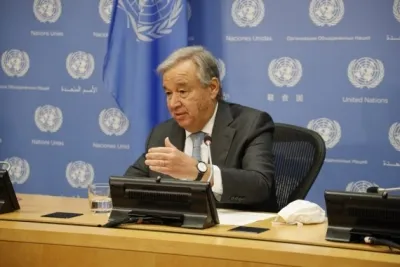How Many More Lives Will Dengue Claim in Bangladesh?

Synopsis
Key Takeaways
- Five new dengue deaths reported in 24 hours.
- Total fatalities for 2025 reach 238.
- 841 new hospital admissions due to viral fever.
- Importance of early diagnosis and preventive measures emphasized.
- Over 50% of deaths occur on the first day of hospital admission.
Dhaka, Oct 14 (NationPress) Tragically, five additional individuals have succumbed to dengue within the last 24 hours, bringing the total fatalities for 2025 to 238 in Bangladesh due to this mosquito-borne illness.
In the same time frame, 841 new patients were hospitalized with viral fever, elevating the total number of infected cases for the year to 56, as reported by the Directorate General of Health Services (DGHS), according to United News of Bangladesh (UNB).
The DGHS reported new infections across various regions: Dhaka Division (214 cases), Dhaka North City Corporation (173 cases), Dhaka South City Corporation (128 cases), Barishal Division (125 cases), Chattogram Division (106 cases), Rangpur Division (47 cases), Khulna Division (26 cases), Mymensingh Division (19 cases), and Sylhet Division (3 cases).
In comparison, 575 deaths were recorded due to dengue in 2024. During that period, there were 101,214 dengue cases with 100,040 recoveries reported in Bangladesh, as per the DGHS.
On October 9, DGHS Director General Abu Jafor stated that while the number of dengue cases in 2025 has surpassed last year’s figures, the mortality rate is lower.
During a press briefing for the 'Typhoid Vaccination Campaign-2025' at the Health Ministry, Jafor mentioned, "Although this year’s dengue infections exceed last year’s, the proportion of fatalities relative to infections has decreased," as reported by UNB.
He emphasized the importance of mosquito breeding control and larval destruction in preventing dengue outbreaks. He stated, "It is essential for individuals to utilize mosquito nets and adopt preventive measures. This responsibility predominantly falls on individuals. Ignoring these steps will complicate the eradication of dengue."
Jafor remarked, "Data indicates that over 50% of dengue-related fatalities in hospitals occur within the first day of admission, suggesting that patients are seeking medical assistance too late. We are striving to provide effective management within healthcare facilities."
He highlighted the necessity for early diagnosis and noted that if dengue is identified in its early stages, it can be managed at home with appropriate medical care. He attributed rising death rates to a lack of awareness, negligence, and delays in seeking treatment.
Dengue is a viral disease caused by the dengue virus (DENV), transmitted to humans via the bites of infected mosquitoes. This illness is prevalent in tropical and subtropical regions globally, especially in urban and semi-urban settings, as stated by the World Health Organization (WHO). Effective prevention and control of dengue hinge on vector management. Although there is no specific treatment for dengue, early detection and timely access to medical care can significantly reduce fatality rates associated with severe dengue.










